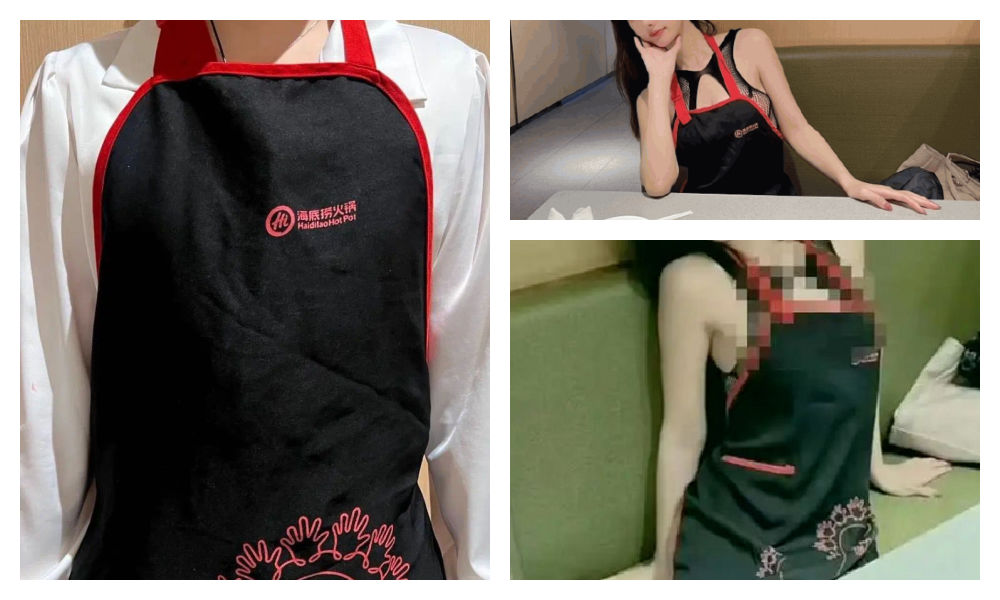Featured
Under Pressure: Chinese Full-Time Mothers Demand Time Off
With the number of stay-at-home mothers on the rise in China, so are the challenges that come with being a full-time mother.
Published
7 years agoon

The story of a full-time mother who was slammed by her husband and mother-in-law for asking some ‘time off’ for traveling during the national holiday has gone viral on Chinese social media. Her account strucks a chord with other stay-at-home moms, who face difficulties in being a full-time mother in a society where family responsibilities are shifting.
Chinese netizen ‘@DoubleTrouble’ (@二捣蛋), a Guangzhou stay-at-home mother of two kids, recently posted about her desire to take “an absence of leave” (请假) from her life as a mum and travel by herself during the Chinese National Holiday.
The woman shared her grievances on WeChat about being severely criticized by her husband and mother-in-law for wanting some time for herself during an 8-day vacation after taking on the sole care of her two children non-stop for years.
The unhappy mother’s story, which was posted some days before the start of China’s national holiday, was picked up by Chinese media and went viral. It triggered heated discussions on the role of China’s stay-at-home mothers within the family.
A FULL-TIME MOTHER’S DILEMMA
“I raised the subject of wanting to go away for a while. But I couldn’t even finish speaking before my mother-in-law said: How dare you think of things like this as a mother?!”
The original text, which was posted by the woman on a WeChat forum for Guangzhou mothers (gzmama.com), is as follows:
“The past two days I’ve had a falling out with my family members. I wanted to use the National Holiday to travel somewhere, but my husband and mother-in-law strongly opposed. Now, there is all this turmoil because of this, with them criticizing me for being selfish. They also say I am irresponsible and that I am an unfit mother. I feel really low.
The situation is that I have two children, a 5-year-old and a 2-year-old, both raised by me. Although my parents-in-law are also in Guangzhou, they’ve never helped me out at all. Even when one child gets sick, it is me who has to take both the children to the hospital.
I’ve been married to my husband for six/seven years now. After we got married, I resigned from my job to become a full-time mother. We did not hire a nanny and I took on the care of the two kids by myself. My husband is very busy, and couldn’t help out either.
The last couple of years have tired me out. All mothers will know what I mean, even if they don’t say it. For this year’s [national] holiday, my husband also got a few days off, which is very rare, so I finally wanted to seize this opportunity to go out for a while, and let my mother-in-law help out for a bit to take care of the children.
A few days ago, we were all having dinner together, when I raised the subject of wanting to go away for a while. But I couldn’t even finish speaking when my mother-in-law said: “How dare you think of things like this as a mother?!” My husband also strongly opposed to me leaving the house. My father-in-law said nothing; he didn’t oppose nor approve.
My husband and my mother-in-law at the dinner table took turns in telling me how selfish I am, and how irresponsible I am, and I could not help but quarrel with them.
Now the family relations have gone sour, and my husband and I have not spoken for few days, I also haven’t gone to see my mother-in-law.
Am I really being selfish? The two children are already older now. The little one does not get breastfed anymore, and the kids get along great, they hardly ever fight.
Sigh, I do not know what to do now. Should I go anyway, regardless if they are against it or not? Or should I just forget about it it and just bitterly stay at home with the kids?”
The woman’s post received some 17,000 views and over 200 comments from other mothers on the Guangzhou forum before it was widely shared and discussed in Chinese media, receiving thousands of reactions on Weibo.
STAY-AT-HOME MOMS IN CHINA
“Once you have children, your time is no longer your own – your time must be dedicated to them.”
More than two-thirds of mothers in China work full-time. According to this report (video) by CGTN, China’s modern-day moms belong to a generation that attaches great importance on having a job – so much so that there is an alleged social stigma to staying at home full-time to raise the children.
“There are a lot of Chinese mothers who work, and this might not necessarily always be their choice,” says Roseann Lake, author of upcoming book Leftover in China: The Women Shaping the World’s Next Superpower.
Lake tells What’s on Weibo that the relatively high percentage of working mothers in China, on the one hand, can be explained through the historical background of the Cultural Revolution, which placed great importance on the full participation of women in the labor force. On the other hand, she notes, it also has a lot to do with today’s China.
“Giving the nature of China’s economy, there is a need for double-working households. And at the same time, there are also many grandparents with free time on their hands who are willing to take care of their grandchildren.”
Lake does not think there necessarily is a social stigma attached to being a full-time mom: “If the financial conditions allow it, women in China can certainly be stay-at-home moms. But then there is the expectation to take on the bulk of looking after the household.”
Nevertheless, Lake stresses, usually – despite expectations that the wife will then take on full care of the household and children – Chinese grandparents will pitch in to help take care of the children, whether the mothers like it or not.
About the case of Chinese netizen ‘@Doubletrouble’, Lake says: “There are plenty of in-laws in China who would pass judgment on something like this, saying that once you have children, your time is no longer your own and your time must be dedicated to them at all times.”
While there is pressure on both working and stay-at-home moms, there is a growing number of Chinese women who choose to fully dedicate themselves to their family life.
According to China Daily, more than 70% of post-90s young mothers are willing to be a full-time mom. By contrast, mothers from the post-80s would rather stay in the workforce; approximately 46% keep on working after becoming a mother.
ONLINE REACTIONS
“If women cannot even have this piece of freedom, then why do we get married at all?”
With the number of stay-at-home mothers on the rise in China, so are the challenges that come with being a full-time mother. The story of @DoubleTrouble shows that there are many other full-time mothers who have a similar story.
“Women have to think of themselves, they should not completely dedicate all of themselves to the family,” one woman (@潼潼囡妈咪) writes: “We need our own social space in order to have the capability to support ourselves and our children.”
“Just go!”, one person pleads: “If women cannot even have this piece of freedom, then why do we get married at all?”
Other people also point out that it is not the mom who is selfish: “If a woman becomes a mother, it doesn’t mean she has to give up on everything. There are 8 days in the National Holiday – why can’t she leave for 2 days? Can’t she have a break from working hard all year round? It’s not only her children, what’s wrong with the mother-in-law looking after them? They are the ones who are selfish and take her for a free labor force.”
There are also commenters who say that there is a big difference between being a stay-at-home mother and a ‘house slave’: “Just go and apply to be a nanny somewhere else,” one person suggests: “At least then you’ll have wages and get days off.”
“The one who has no sense of responsibility is not this mother, but her husband,” another woman writes.
“It’s not like she’s leaving for two months,” one commenter said: “If women cannot even enjoy this freedom and support after getting married and having babies, then what’s the point?”
“When I get married,” a male netizen writes: “I want my wife to take time for herself and go outside, I will watch the kids. I don’t want to see her depressed or restless.”
Despite all the support for @DoubleTrouble, and all the other mothers demanding that ‘time off’ should be normal for all stay-at-home moms, there are also some who disagree.
“When the child is 2 years old, they are too young. Wait until they go to school,” some say. Or: “Just take the children and go on a trip together with your husband, the four of you together as a family.”
THE “GREAT TRANSFORMATION”
“The grandmother does not have the duty to help out her daughter-in-law, but then she also shouldn’t expect her daughter-in-law to take care of her when she is old and sick.”
The recent account of ‘@Doubletrouble’ is not the only complaint from full-time mothers who feel the pressure of taking on the full care of their children and not getting any help nor personal time. An important recurring issue is the changing role of the in-laws, who traditionally lived with their son’s family and usually have an active role in raising their grandchildren.
One woman from Fujian (@林小夕的梦) cries out on Weibo: “I am so tired, I am on the verge of collapse. It’s unbearable being a full-time mother. Don’t ask me about my mother-in-law or why she doesn’t help me out – I’d be better off without her, she doesn’t understand.”
The transformations of Chinese traditional family structures in the modern-day era have not necessarily brought about equal gender divisions in the household.
As pointed out by Harriet Evans in The Gender of Communication (2010), the focus in Chinese society has gradually shifted over the past half-century, as there is “[a] shift away from a collectivist and family-oriented ethics of personal responsibilities to an individualistic ethics of rights and self-development” (981).
This “great transformation”1 manifests itself, amongst others, in the clashes between those younger mothers who seek self-fulfillment and personal satisfaction, and those older generations who still expect them to fulfill the traditional women’s role in the domestic sphere, while they, as grandparents, now also play a much less significant role in the upbringing of their grandchildren – not just because they are detached more from the family in social terms, but also often because there is a bigger spatial distance between families.
“The grandmother does not have the duty to help out her daughter-in-law, but then she shouldn’t expect her daughter-in-law to take care of her either when she is old and sick,” a popular comment said.
Since the post has gone viral, @DoubleTrouble has not given an update about whether or not she did go on that trip. If not, at least her story has triggered some relevant discussions online.
“I just hope this post will receive enough attention so that women who want to become a full-time mother will realize the difficulties they might face,” one woman writes.
By Manya Koetse
Follow @whatsonweibo
References
Evans, Harriet. 2010. “The Gender of Communication: Changing Expectations of Mothers and Daughters in Urban China.” The China Quarterly (204): 980-1000.
1 Evans (2010) quotes Yan Yuxiang here, author of The Individualization of Chinese Society (London: Berg, 2009).
Spotted a mistake or want to add something? Please let us know in comments below or email us.
©2017 Whatsonweibo. All rights reserved. Do not reproduce our content without permission – you can contact us at info@whatsonweibo.com.
Manya Koetse is the founder and editor-in-chief of whatsonweibo.com. She is a writer, public speaker, and researcher (Sinologist, MPhil) on social trends, digital developments, and new media in an ever-changing China, with a focus on Chinese society, pop culture, and gender issues. She shares her love for hotpot on hotpotambassador.com. Contact at manya@whatsonweibo.com, or follow on Twitter.

China Brands, Marketing & Consumers
Zara Dress Goes Viral in China for Resemblance to Haidilao Apron
Who’s gonna buy this Zara dress in China? “I’m afraid that someone will say I stole the apron from Haidilao.”
Published
16 hours agoon
April 19, 2024
A short dress sold by Zara has gone viral in China for looking like the aprons used by the popular Chinese hotpot chain Haidilao.
“I really thought it was a Zara x Haidialo collab,” some customers commented. Others also agree that the first thing they thought about when seeing the Zara dress was the Haidilao apron.

The “original” vs the Zara dress.
The dress has become a popular topic on Xiaohongshu and other social media, where some images show the dress with the Haidilao logo photoshopped on it to emphasize the similarity.

One post on Xiaohongshu discussing the dress, with the caption “Curious about the inspiration behind Zara’s design,” garnered over 28,000 replies.
Haidilao, with its numerous restaurants across China, is renowned for its hospitality and exceptional customer service. Anyone who has ever dined at their restaurants is familiar with the Haidilao apron provided to diners for protecting their clothes from food or oil stains while enjoying hotpot.
These aprons are meant for use during the meal and should be returned to the staff afterward, rather than taken home.

The Haidilao apron.
However, many people who have dined at Haidilao may have encountered the following scenario: after indulging in drinks and hotpot, they realize they are still wearing a Haidilao apron upon leaving the restaurant. Consequently, many hotpot enthusiasts may have an ‘accidental’ Haidilao apron tucked away at home somewhere.
This only adds to the humor of the latest Zara dress looking like the apron. The similarity between the Zara dress and the Haidilao apron is actually so striking, that some people are afraid to be accused of being a thief if they would wear it.
One Weibo commenter wrote: “The most confusing item of this season from Zara has come out. It’s like a Zara x Haidilao collaboration apron… This… I can’t wear it: I’m afraid that someone will say I stole the apron from Haidilao.”

Funnily enough, the Haidilao apron similarity seems to have set off a trend of girls trying on the Zara dress and posting photos of themselves wearing it.

It’s doubtful that they’re actually purchasing the dress. Although some commenters say the dress is not bad, most people associate it too closely with the Haidilao brand: it just makes them hungry for hotpot.
By Manya Koetse
Independently reporting China trends for over a decade. Like what we do? Support us and get the story behind the hashtag by subscribing:
Spotted a mistake or want to add something? Please let us know in comments below or email us. First-time commenters, please be patient – we will have to manually approve your comment before it appears.
©2024 Whatsonweibo. All rights reserved. Do not reproduce our content without permission – you can contact us at info@whatsonweibo.com.
China Arts & Entertainment
“Old Bull Eating Young Grass”: 86-Year-Old Chinese Painter Fan Zeng Marries 36-Year-Old Xu Meng
Online reactions to the news of Fan’s marriage to Xu Meng, his fourth wife, reveal that the renowned artist is not particularly well-liked among Chinese netizens.
Published
2 days agoon
April 18, 2024
The recent marriage announcement of the renowned Chinese calligrapher/painter Fan Zeng and Xu Meng, a Beijing TV presenter 50 years his junior, has sparked online discussions about the life and work of the esteemed Chinese artist. Some netizens think Fan lacks the integrity expected of a Chinese scholar-artist.
Recently, the marriage of a 86-year-old Chinese painter to his bride, who is half a century younger, has stirred conversations on Chinese social media.
The story revolves around renowned Chinese artist, calligrapher, and scholar Fan Zeng (范曾, 1938) and his new spouse, Xu Meng (徐萌, 1988). On April 10, Fan announced their marriage through an online post accompanied by a picture.
In the picture, Fan is seen working on his announcement in calligraphic form.

Fan Zeng announces his marriage on Chinese social media.
In his writing, Zeng shares that the passing of his late wife, three years ago, left him heartbroken, and a minor stroke also hindered his work. He expresses gratitude for Xu Meng’s care, which he says led to his physical and mental recovery. Zeng concludes by expressing hope for “everlasting harmony” in their marriage.
Fan Zeng is a calligrapher and poet, but he is primarily recognized as a contemporary master of traditional Chinese painting. Growing up in a well-known literary family, his journey in art began at a young age. Fan studied under renowned mentors at the Academy of Fine Arts in Beijing, including Wu Zuoren, Li Keran, Jiang Zhaohe, and Li Kuchan.
Fan gained global acclaim for his simple yet vibrant painting style. He resided in France, showcased his work in numerous exhibitions worldwide, and his pieces were auctioned at Sotheby’s and Christie’s in the 1980s.[1] One of Fan’s works, depicting spirit guardian Zhong Kui (钟馗), was sold for over 6 million yuan (828,000 USD).

Zhong Kui in works by Fan Zeng.
In his later years, Fan Zeng transitioned to academia, serving as a lecturer at Nankai University in Tianjin. At the age of 63, he assumed the role of head of the Nankai University Museum of Antiquities, as well as holding various other positions from doctoral supervisor to honorary dean.
By now, Fan’s work has already become part of China’s twentieth-century art history. Renowned contemporary scholar Qian Zhongshu once remarked that Fan “excelled all in artistic quality, painting people beyond mere physicality.”
A questionable “role model”
Fan’s third wife passed away in 2021. Later, he got to know Xu Meng, a presenter at China Traffic Broadcasting. Allegedly, shortly after they met, he gifted her a Ferrari, sparking the beginning of their relationship.

A photo of Xu and her Hermes Birkin 25 bag has also been making the rounds on social media, fueling rumors that she is only in it for the money (the bag costs more than 180,000 yuan / nearly 25,000 USD).
On Weibo, reactions to the news of Fan’s marriage to Xu Meng, his fourth wife, reveal that the renowned artist is not particularly well-liked among netizens. Despite Fan’s reputation as a prominent philanthropist, many perceive his recent marriage as yet another instance of his lack of integrity and shamelessness.

Fan Zeng and Xu Meng. Image via Weibo.
One popular blogger (@好时代见证记录者) sarcastically wrote:
“Warm congratulations to the 86-year-old renowned contemporary erudite scholar and famous calligrapher Fan Zeng, born in 1938, on his marriage to Ms Xu Meng, a 50 years younger 175cm tall woman who is claimed to be China’s number one golden ratio beauty. Mr Fan Zeng really is a role model for us middle-aged greasy men, as it makes us feel much less uncomfortable when we’re pursuing post-90s youngsters as girlfriends and gives us an extra shield! Because if contemporary Confucian scholars [like yourself] are doing this, then we, as the inheritors of Confucian culture, can surely do the same!“
Various people criticize the fact that Xu Meng is essentially just an aide to Fan, as she can often be seen helping him during his work. One commenter wrote: “Couldn’t he have just hired an assistant? There’s no need to turn them into a bed partner.”
Others think it’s strange for a supposedly scholarly man to be so superficial: “He just wants her for her body. And she just wants him for his inheritance.”
“It’s so inappropriate,” others wrote, labeling Fan as “an old bull grazing on young grass” (lǎoniú chī nèncǎo 老牛吃嫩草).
Fan is not the only well-known Chinese scholar to ‘graze on young grass.’ The famous Chinese theoretical physicist Yang Zhenning (杨振宁, 1922), now 101 years old, also shares a 48-year age gap with his wife Weng Fen (翁帆). Fan, who is a friend of Yang’s, previously praised the love between Yang and Weng, suggesting that she kept him youthful.

Older photo posted on social media, showing Fan attending the wedding ceremony of Yang Zhenning and his 48-year-younger partner Weng Fen.
Some speculate that Fan took inspiration from Yang in marrying a significantly younger woman. Others view him as hypocritical, given his expressions of heartbreak over his previous wife’s passing, and how there’s only one true love in his lifetime, only to remarry a few years later.
Many commenters argue that Fan Zeng’s conduct doesn’t align with that of a “true Confucian scholar,” suggesting that he’s undeserving of the praise he receives.
“Mr. Wang from next door”
In online discussions surrounding Fan Zeng’s recent marriage, more reasons emerge as to why people dislike him.
Many netizens perceive him as more of a money-driven businessman rather than an idealistic artist. They label him as arrogant, critique his work, and question why his pieces sell for so much money. Some even allege that the only reason he created a calligraphy painting of his marriage announcement is to profit from it.
Others cast doubt on his status as a Chinese calligraphy ‘grandmaster,’ noting that his calligraphy style is not particularly impressive and may contain typos or errors. His wedding announcement calligraphy appears to blend traditional and simplified characters.

Netizens have pointed out what looks like errors or typos in Fan’s calligraphy.
Another source of dislike stems from his history of disloyalty and his feud with another prominent Chinese painter, Huang Yongyu (黄永玉). Huang, who passed away in 2023, targeted Fan Zeng in some of his satirical paintings, including one titled “When Others Curse Me, I Also Curse Others” (“人骂我,我亦骂人”). He also painted a parrot, meant to mock Fan Zeng’s unoriginality.

Huang Yongyu made various works targeting Fan Zeng.
In retaliation, Fan produced his own works mocking Huang, sparking an infamous rivalry in the Chinese art world. The two allegedly almost had a physical fight when they ran into each other at the Beijing Hotel.

Fan Zeng mocked Huang Yongyu in some of his works.
Fan and Huang were once on good terms though, with Fan studying under Huang at the Central Academy of Fine Arts in Beijing. Through Huang, Fan was introduced to the renowned Chinese novelist Shen Congwen (沈从文, 1902-1988), Huang’s first cousin and lifelong friend. As Shen guided Fan in his studies and connected him with influential figures in China’s cultural circles, their relationship flourished.
However, during the Cultural Revolution, when Shen was accused of being a ‘reactionary,’ Fan Zeng turned against him, even going as far as creating big-character posters to criticize his former mentor.[2] This betrayal not only severed the bond between Shen and Fan but also ended Fan’s friendship with Huang, and it is still remembered by people today.
Fan Zeng’s behavior towards another former mentor, the renowned painter Li Kuchan (李苦禪, 1899-1983), was also controversial. Once Fan gained fame, he made it clear that he no longer respected Li as his teacher. Li later referred to Fan as “a wolf in sheep’s clothes,” and apparently never forgave him. Although the exact details of their falling out remain unclear, some blame Fan for exploiting Li to further his own career.
There are also some online commenters who call Fan Zeng a “Mr Wang from next door” (隔壁老王), a term jokingly used to refer to the untrustworthy neighbor who sleeps with one’s wife. This is mostly because of the history of how Fan Zeng met his third wife.
Fan’s first wife was the Chinese female calligrapher Lin Xiu (林岫), who came from a wealthy family. During this marriage, Fan did not have to worry about money and focused on his artistic endeavours. The two had a son, but the marriage ended in divorce after a decade. Fan’s second wife was fellow painter Bian Biaohua (边宝华), with whom he had a daughter. It seems that Bian loved Fan much more than he loved her.
It is how he met his third wife that remains controversial to this day. Nan Li (楠莉), formerly named Zhang Guiyun (张桂云), was married to performer Xu Zunde (须遵德). Xu was a close friend of Fan, and helped him out when Fan was still poor and trying to get by while living in Beijing’s old city center.
Wanting to support Fan’s artistic talent, Xu let Fan Zeng stay over, supported him financially, and would invite him for meals. Little did he know that while Xu was away to work, Fan enjoyed much more than meals alone; Fan and Xu’s wife engaged in a secret decade-long affair.
When the affair was finally exposed, Xu Zunde divorced his wife. Still, they would use his house to meet and often locked him out. Three years later, Nan Li officially married Fan Zeng. Xu not only lost his wife and friend but also ended up finding his house emptied, his two sons now bearing Fan’s surname.
When Nan Li passed away in 2021, Fan Zeng published an obituary that garnered criticism. Some felt that the entire text was actually more about praising himself than focusing on the life and character of his late wife, with whom he had been married for forty years.

Fan Zeng and his four wives
An ‘old pervert’, a ‘traitor’, a ‘disgrace’—there are a lot of opinions circulating about Fan that have come up this week.
Despite the negativity, a handful of individuals maintain a positive outlook. A former colleague of Xu Meng writes: “If they genuinely like each other, age shouldn’t matter. Here’s to wishing them a joyful marriage.”
By Manya Koetse
[1]Song, Yuwu. 2014. Biographical Dictionary of the People’s Republic of China. United Kingdom: McFarland & Company, 76.
[2]Xu, Jilin. 2024. “Xu Jilin: Are Shen Congwen’s Tears Related to Fan Zeng?” 许纪霖:沈从文的泪与范曾有关系吗? The Paper, April 15. https://www.thepaper.cn/newsDetail_forward_27011031. Accessed April 17, 2024.
Independently reporting China trends for over a decade. Like what we do? Support us and get the story behind the hashtag by subscribing:
Spotted a mistake or want to add something? Please let us know in comments below or email us. First-time commenters, please be patient – we will have to manually approve your comment before it appears.
©2024 Whatsonweibo. All rights reserved. Do not reproduce our content without permission – you can contact us at info@whatsonweibo.com.
Subscribe

Zara Dress Goes Viral in China for Resemblance to Haidilao Apron

“Old Bull Eating Young Grass”: 86-Year-Old Chinese Painter Fan Zeng Marries 36-Year-Old Xu Meng

Chengdu Disney: The Quirkiest Hotspot in China

Where to Eat and Drink in Beijing: Yellen’s Picks

Weibo Watch: Burning BMWs

The ‘Two Sessions’ Suggestions: Six Proposals Raising Online Discussions

A Snowball Effect: How Cold Harbin Became the Hottest Place in China

Jia Ling Returns to the Limelight with New “YOLO” Movie and 110-Pound Weight Loss Announcement

Top 9 Chinese Movies to Watch This Spring Festival Holiday

Party Slogan, Weibo Hashtag: “The Next China Will Still Be China”

From Pitch to Politics: About the Messy Messi Affair in Hong Kong (Updated)

Weibo Watch: Frogs in Wells

Looking Back on the 2024 CMG Spring Festival Gala: Highs, Lows, and Noteworthy Moments

Two Years After MU5735 Crash: New Report Finds “Nothing Abnormal” Surrounding Deadly Nose Dive

More than Malatang: Tianshui’s Recipe for Success
Get in touch
Would you like to become a contributor, or do you have any tips or suggestions? Get in touch here!
Popular Reads
-

 China Insight1 month ago
China Insight1 month agoThe ‘Two Sessions’ Suggestions: Six Proposals Raising Online Discussions
-

 China Insight3 months ago
China Insight3 months agoA Snowball Effect: How Cold Harbin Became the Hottest Place in China
-

 China Arts & Entertainment3 months ago
China Arts & Entertainment3 months agoJia Ling Returns to the Limelight with New “YOLO” Movie and 110-Pound Weight Loss Announcement
-

 China Arts & Entertainment2 months ago
China Arts & Entertainment2 months agoTop 9 Chinese Movies to Watch This Spring Festival Holiday





Bruce Humes
October 7, 2017 at 9:32 am
It’s quite revealing that — at least in the Weibo comments cited — all the potential “solutions” are limited to family members.
There is no mention of hiring a baby-sitter, part-time amah or full-time nanny. How come?
Obviously, many Chinese households couldn’t afford the latter, but in 1st- and 2nd-tier cities, they can. In Hong Kong and Taiwan, many middle-class families hire part- or full-time nannies to do housework and look after children. Hong Kongers in particular do so, and insist on a Filipina or Indonesian female who is both truly caring about children, and can teach them English to boot!
Among the Chinese mothers I know in Shenzhen and Guangzhou, however, hiring someone from outside the family to look after one’s children is considered very problematic, and most refuse to do so. Why? Because they are afraid their hires will 1) Steal from them, 2) Mistreat their children if a relative is not present, and/or 3) Kidnap their children and sell them to traffickers.
Tells you a lot about contemporary Chinese society, doesn’t it?